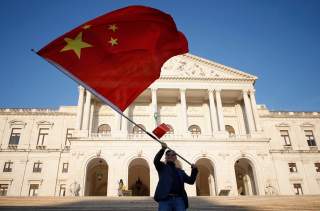America Must Prepare for the Coming Chinese Empire
The last thing American policymakers or strategists should assume is that somehow Americans are superior to the Chinese.
WHEREAS INDIA and Taiwan are greatly affected by American sea power, the desert immensities of the Middle East are much less so. This is not an accident, but indicates something crucial. In a century when we will try to stay out of debilitating land conflicts that require large armies, we are better off relying on our navy which can project power without dragging us into bloody wars nearly as much. It is the U.S. Navy that will counter Chinese power along the semi-circle of the navigable Eurasian rimland, from the eastern Mediterranean to the Sea of Japan. And with less of a chance of drifting into costly military conflicts, we will have a better possibility of healing and invigorating our democracy at home. This is what grand strategy is fundamentally about.
Grand strategy is not about what we should do abroad. It is about what we should do abroad consistent with our economic and social condition at home.
Now, keep in mind my own, three-year rule. No matter how necessary and inspiring a military conflict, the American public will only give policymakers three years to settle it. America’s involvement in World War I lasted little more than eighteen months. In World War II, United States troops did not arrive in the Eastern Hemisphere until 1942, and by the Battle of Okinawa in 1945 there was public clamoring to end the Pacific war (as the war in Europe had already ended). The Korean War began in 1950 and by 1952 was unpopular, with Eisenhower forced to end it in 1953. American troops landed in large numbers in Vietnam in 1965 and the public turned against that war in 1968. The Iraq War was launched in 2003 and the public turned against it in 2006. We should aim never to test this three-year rule again. (In Afghanistan, we were able to break the rule only because we brought casualties down dramatically.) That means keeping a prolonged rivalry with China nonviolent in terms of blood-cost. We should engage on a number of fronts: cyber, economic, naval, diplomatic and so on, without open warfare. This can be achieved by not making a fetish out of the South China Sea. The U.S.-China relationship is too wide-ranging and organic to be reduced to a military dispute about one region. Military, trade and other areas of contention should not be kept in silos, since they can indeed interact.
To repeat, grand strategy for the United States in the twenty-first century is, in the end, about restraining from violence in order to concentrate on the home front, and yet compete with China at the same time: which, in turn, means recognizing certain geographical imperatives. (Of course, there is also the realm of ideas: so that it is tragic that President Trump abrogated the Trans-Pacific Partnership, which as a free-trading alliance would have given us a big idea to compete with Belt and Road.)
For some states and empires, which are victims of geography rather than blessed by it—Byzantium, Habsburg Austria—grand strategy is a necessity for survival. Contrarily, America’s geographical blessings have meant it can incur one disaster after another without paying a commensurate price. But as technology shrinks distance, enmeshing our continental half-island deeper into an unstable world, the United States finally becomes truly vulnerable: meaning it can no longer afford heroic delusions.
Consider: during the Cold War we didn’t need to worry about grand strategy because we already had one. It was called containment. George Kennan eschewed the hot-headed approach of those in the late-1940s and early-1950s who believed that it was possible to defeat the Soviet Union by subversion, special operations forces and other such desperate measures. Kennan understood that since Soviet Communism was fundamentally flawed as a system of governance, it would eventually falter and all we had to do was outlast it (just as we are likely to outlast Communist China if only we are patient). Thus, blessed by geography for so long, and blessed by a wise and temperate grand strategy for over four decades, we lost the art of thinking critically about ourselves, which, once again, is also what grand strategy is ultimately about.
Unable to look ourselves in the mirror and see our flaws and limitations, we concentrated too much on our military, and invaded or intervened in one Muslim country after another in the 2000s and achieved nothing as a result. Intervening in the former Yugoslavia in the 1990s was successful in stopping a war, but the creation of ethnic cantons that followed did not lay a groundwork for the future, and even if it had done so, that would not have risen to the level of grand strategy given Yugoslavia’s secondary importance. So we are starting from scratch.
Starting from scratch means realizing that however inspiring the dreams of our elite are, those dreams will be stillborn if not grounded in both granular, local realities around the world and widespread public support at home that spans party lines—and that must be sustained over the long-term. We must be respectful of local realities, whether in Wyoming or Afghanistan.
Robert D. Kaplan is a managing director for global macro at Eurasia Group. His most recent book is The Return of Marco Polo’s World: War, Strategy, and American Interests in the Twenty-first Century.
Image: Reuters

